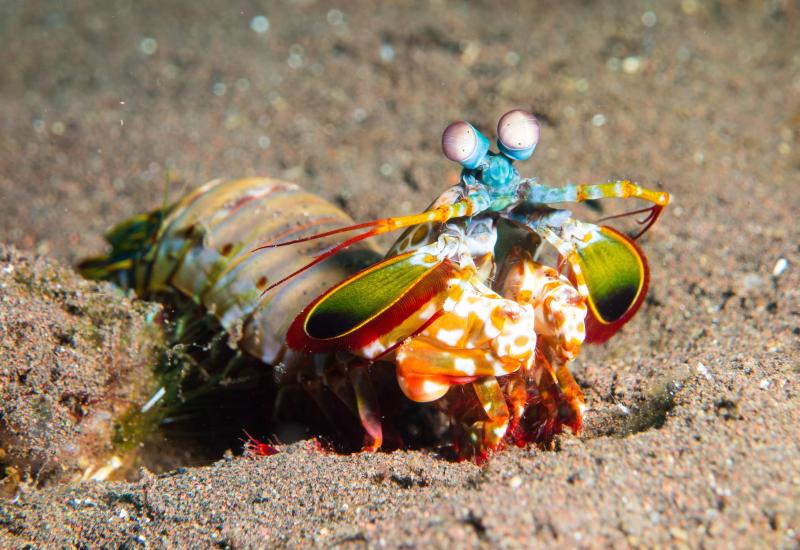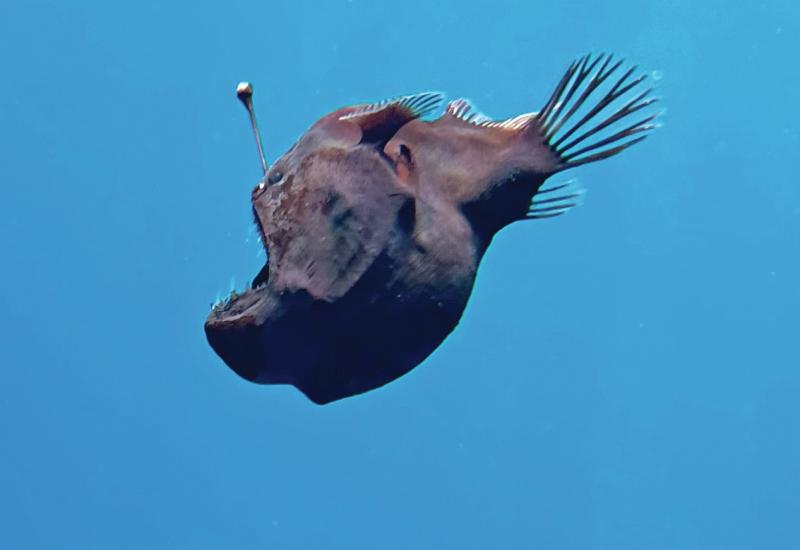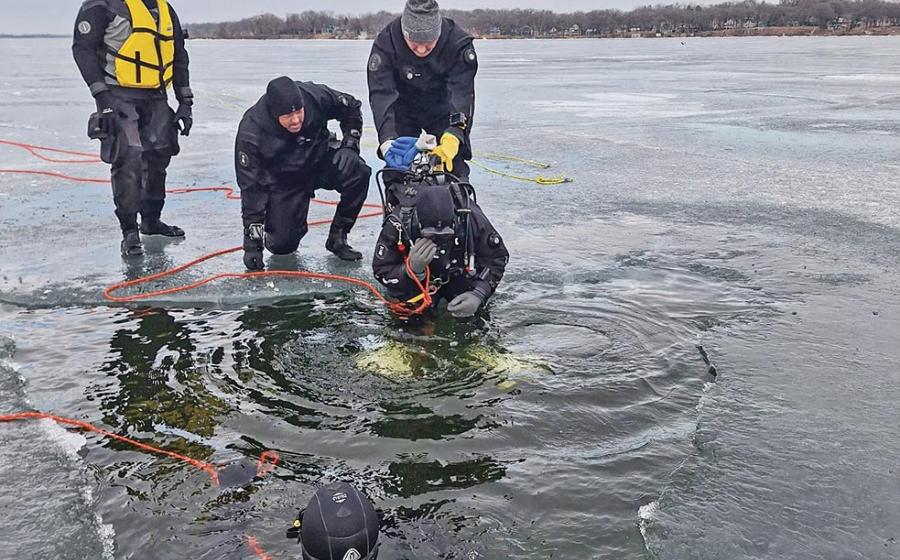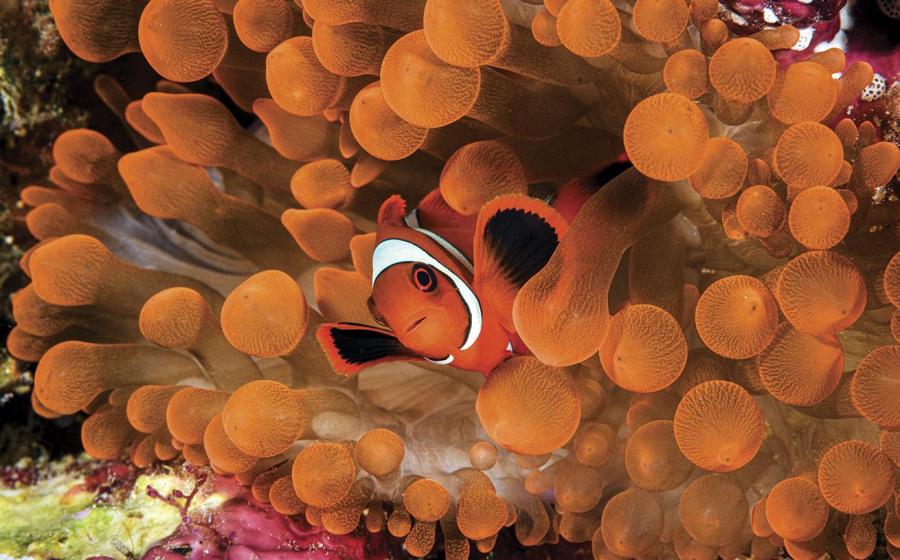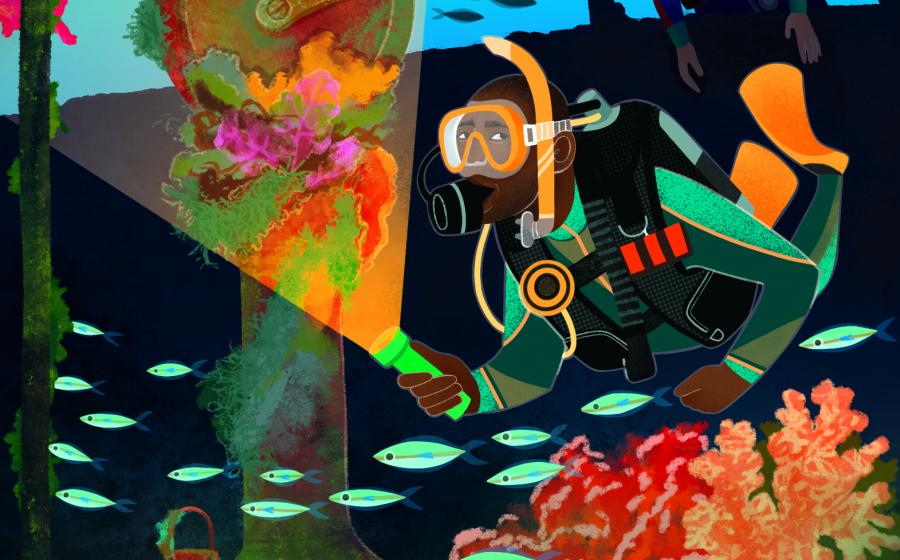30 Things You Can Do for the Ocean
We're getting ready for Earth Day, Scuba Diving style! Want to help our oceans by being more involved in marine conservation? From helping coral reefs to saving sharks to ending marine debris, we've got 30 things you can do to help!
Mark Your Calendar
- International Coastal Cleanup >> The world's largest one-day volunteer effort on behalf of the world's waterways. For more information, visit www.coastalcleanup.org.
- Dive In to Earth Day Events >> Check Project AWARE's Action page to find Earth Day dive events in your backyard.
- Great Annual Fish Count >> Snorkel or dive America's dive sites and help scientists better understand reef fish populations. www.fish count.org. To find dates for events in your region, www.fishcount.org/events/calendar.html.
Select images provided by Shutterstock.com
Want to help our oceans by being more involved in marine conservation? From helping coral reefs to saving sharks to ending marine debris, we've got 30 things you can do to help and a list of organizations to get involved with! Take me to the list of organizations so I can get involved now.

ShutterstockSea turtle
Or touch them. Or ride them. All of these interactions can interrupt the animals' feeding and mating habits enough to put them in danger. You can find the Coral Reef Alliance's guidelines to whale, dolphin and turtle watching at coral.org.

ShutterstockUnderwater reef
If each diver refrains from taking a souvenir home from the deep, there just might be something left for the next diver that's worth seeing.

ShutterstockSustainable fishing
Some fish stocks are well-managed; others are being fished to the brink of extinction.
Some farmed species offer hope for meeting humanity's rising food demands; others are destroying coastal environments around the world. It's tough to know what's the right thing to buy or eat; luckily, several environmental groups have committed much energy and research to these very questions.
Several nonprofit groups offer guides that you can print out, stick in your wallet and consult whenever you're buying seafood or ordering dinner in a restaurant. Three of the more popular wallet guides are distributed by Blue Ocean Institute (blueoceaninstitute.org), Environmental Defense and the Monterey Bay Aquarium (mbayaq.org). The Seafood Choices Alliance also publishes a synthesis of the three lists at thefishlist.org.

ShutterstockCanoe
Try not to take too much of any one species, and if you are diving with novices, consider that they will likely follow your example the next time they dive--and so will the friends they bring down below, and so on.

ShutterstockBeach cleanup
Each September, hundreds of thousands of people around the world gather on beaches and below the surface for the International Coastal Cleanup. But at least as important as the debris that's picked up off the shore is the valuable data on ocean currents and marine pollution that researchers glean from the notes of volunteers. For more information, visit www.coastalcleanup.org.

ShutterstockReef checkups
Volunteers in more than 60 countries record their observations of coral reef health for Reef Check. The information that divers gather helps international and local agencies plan for preserving and restoring coral reefs; for more information, go to reefcheck.org.
Similarly, ReefBase, a comprehensive global information system with a vast amount of online information about coral reefs, has volunteers compile reports that help monitor the phenomenon of coral bleaching. When corals expel the algal cells that live inside their tissue, they bleach and look dead, but are often still alive. A wide range of environmental factors can cause bleaching, but high sea temperatures cause the worst episodes--and as such, might be the "canary in the coal mine" for climate change's effect on marine life. Divers can help scientists understand coral bleaching by filing reports.

ShutterstockRaja ampat indonesia
These underwater parks offer marine life a needed refuge to recover from decades of intensifying fishing pressure. If the parks charge or request a user's fee, think of it as a down payment on the heirlooms we owe the next generation of divers.

ShutterstockRecycle
The fewer disposable containers we use, the fewer we'll see in the ocean and shorelines. Dispose of toxic wastes — especially batteries — in the safest way available to you; many communities collect such wastes.

ShutterstockOil
The less you drive, the more you take public transportation, car pool or bike, the fewer fossil fuel emissions trickle their way into our oceans. A 2002 National Academy of Sciences study found that the oil flowing from our streets and driveways into the oceans amounts to one Exxon Valdez oil spill, or nearly 11 million gallons, every eight months.

ShutterstockBoating and scuba diving
When you're on a boat, take care not to lose anything overboard. Secure everything, and return all trash to land.
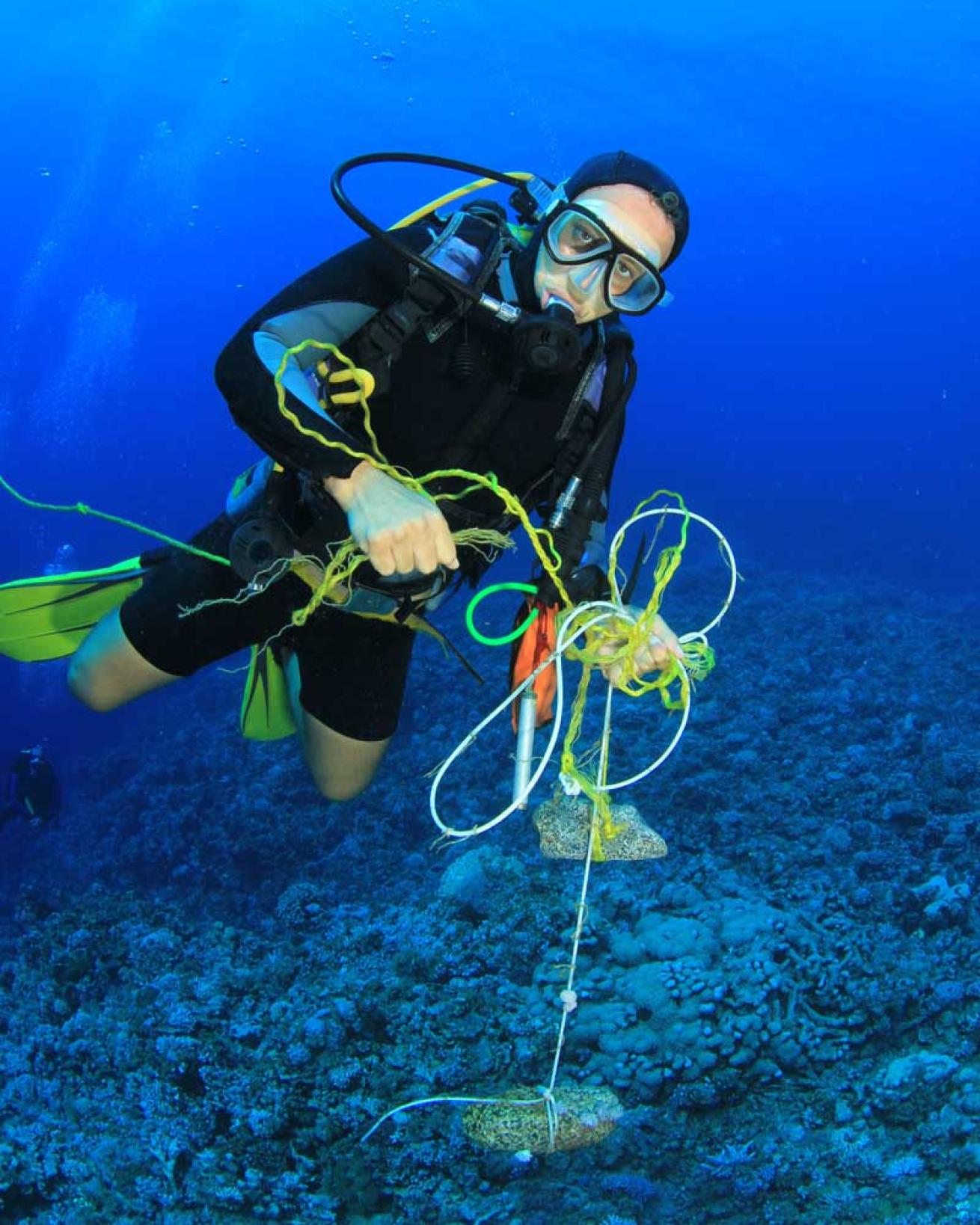
ShutterstockDive Against Debris
Resolution: I will take part in a Dive Against Debris.

ShutterstockNational environment trust
The National Environment Trust is sponsoring a campaign called Global Ocean Legacy to enlist people who love the water to do their part to protect and preserve the oceans and its resources. Check out the interactive map on important and unspoiled places in the sea.

ShutterstockCrowded dive sites
If the dive site is packed, ask your fellow divers and dive operator if they mind seeking out a less crowded site. Crowds can't help already-stressed reefs.

ShutterstockReef scape
Don't touch anything on a dive, not with your feet, not with your hands, not with your regulator. Even slight contact can damage coral; some can sting you back.

Hamid RadUnderwater mangroves
Sea grasses, mangrove trees and native vegetation protect reefs in many ways: by trapping sand and sediment that otherwise covers and smothers corals; by filtering toxins out; and by sharing the brunt of ferocious storms.

ShutterstockScuba diving education
Spread the word about coral reef bleaching and enlist fellow divers to care for and preserve their environment.

ShutterstockConserve water
On land, that means washing your car on your lawn or at a car wash that recycles the used water. Don't let the dirty water and soap run off into the storm drains, which eventually drain into the ocean. Route rooftop downspouts into landscaped areas for the same reason.
On a boat, that means using a pump-out facility for your wastewater instead of hoping dilution is the solution to your personal pollution.

ShutterstockEco friendly cleaning products
Avoid using fertilizers and pesticides on your lawn and garden. We can reverse the nutrients and toxins pouring into rivers and streams with each rain if we recognize that underwater environments suffer when our flood of nutrients starve the water of oxygen.

ShutterstockStyrofoam
Scientists with Deep Ocean Exploration Research report spotting Styrofoam broken into tiny pieces in some of the deepest parts of the ocean. Because it doesn't decompose, it can cause big digestive problems for tiny animals like brine shrimp and other bottom-feeders.

ShutterstockScuba diving moorings
They don't install themselves. For ideas and inspiration, see the the National Oceanic and Atmospheric Administration (NOAA) mooring-buoy planning guide.

ShutterstockCommunicate with fellow scuba divers
The more they know, the less likely they are to damage the reefs.

ShutterstockBoat anchors
Avoid dropping anchors on coral reefs; where possible, seek out a mooring buoy. Mooring buoys enable many boats to tie down at the same location and spare corals from the constant disturbance.

ShutterstockScuba diving homework
Before you leave home, research your destination and its operators and resorts. Some countries have more enlightened zoning and marine-protected areas than others; seek them out. Search for a dive operation, resort or boat that adheres to ecotourism principles.

ShutterstockSpecialty license plate
A few states offer them: If you live in Florida, an $85 specialty license plate urges people to "Protect Our Reefs," "Save Our Seas," "Protect Wild Dolphins" and more, plus raises money for research and reef-restoration programs.

ShutterstockREEF ID books
Take a cue from birders and keep a "life list" of each fish, creature and coral you see on dives. You'll impress your friends and fellow divers with your knowledge, and you might encourage other people to care enough to preserve the biodiversity we love. The REEF ID books from New World Publications are our favorite resource.

ShutterstockFishing lines
Fishing lines are strangling reefs in every ocean, and your knife is the best solution to the tangled mess. Be careful not to pull on the line, which could cause even more damage to the reef than just leaving it. Instead, carefully cut away any lines or nets--even clothing--you see choking a reef.

ShutterstockCitizen science dives
Recreational divers have something extraordinarily valuable to offer marine science: lots of time in the water. In recent years, savvy scientists have been enlisting civilians in their research through reef, fish and sea life monitoring programs.
The Reef Environmental Education Foundation (REEF), a nonprofit group of divers, keeps track of how many of which fish its members see during dives, then offers its data for researchers and regulatory agencies to crunch. Check the REEF web site, www.reef.org, for more information on how you can get involved in the Fish Survey Project.
Another good way to put your dives to scientific use is to join REEF's Great Annual Fish Count in July. To find dates for events in your region, visit fishcount.org.

ShutterstockUnderwater photos
With the rapid spread of underwater and now digital cameras, divers have more opportunities to record the underwater environment the way they find it.
A nonprofit web site that provides photos to universities, nonprofit groups and government agencies, the Marine Photobank, seeks submissions from amateur photographers for their growing visual archive of the world's true sunken treasures. See marinephotobank.org for information about how you can submit your photos.

ShutterstockTourist souvenirs
Avoid buying souvenirs made of coral, turtles and other marine life, and don't bring anything home for your fish tank, either.
It's often illegal, but it's never smart for someone who likes to see these things under water. The U.N. Environment Programme reports that the aquarium trade snatches more than 20 million tropical fish and as many as 10 million other marine animals each year. When fish are caught using sodium cyanide, coral reefs suffer as well. If you do buy pet fish, look for certification by the Marine Aquarium Council.

ShutterstockGlobe
Recent years have seen a proliferation of nonprofit groups working on behalf of marine conservation. One of the best things you can do to help the environment is to join one of these groups and donate to the cause. Here are some of the best:
Blue Ocean Institute (blueocean.org/(http://www.blueoceaninstitute.org)) focuses on deepening connections between humanity and living seas.
Blue Voice (www.bluevoice.org) documents transgressions against marine life on film.
Conservation International (www.conservation.org) applies science, economics, policy and community participation to protect ecosystems.
Coral Reef Alliance (www.coral.org) works with global communities around the world, helping to solve coral reef conservation challenges.
Coral Restoration Foundation (coralrestoration.org) engages communities in coral nursery and restoration efforts by encouraging long-term involvement.
The Cousteau Society (www.cousteau.org) is dedicated to the preservation of nature for future generations.
Earth Island Institute (www.earthisland.org) serves as an incubator and support network for more than 30 conservation and restoration projects.
Environmental Defense (http://www.edf.org/) links science, economics and law in environmental advocacy.
Greenpeace (www.greenpeace.org) uses nonviolent confrontation to expose environmental problems and to force solutions.
Marine Conservation Biology Institute (http://www.marine-conservation.org/) works to protect and restore marine life.
Marine Fish Conservation Network (www.conservefish.org) lobbies government officials in support of marine conservation legislation.
Monterey Bay Aquarium (www.mbayaq.org) coordinates marine conservation and research programs.
Wild Oceans (www.savethefish.org) works to conserve the world's ocean fish.
National Environment Trust's Global Ocean Legacy Campaign (www.oceanlegacy.org) is a broad national effort to build support for ocean and fish protection.
Natural Resources Defense Council (www.nrdc.org) uses law, science and activism to protect the planet's wildlife and wild places.
The Nature Conservancy (www.nature.org) works to protect more than 117 million acres around the world.
New England Aquarium (www.neaq.org) provides leadership for the preservation and sustainable use of aquatic resources.
Oceana (www.oceana.org) works to restore and protect the world's oceans through policy advocacy, science, law and public education.
The Ocean Conservancy (www.oceanconservancy.org) seeks to inform, inspire and empower through science-based advocacy, research and public education.
The Ocean Project (www.theoceanproject.org) works to promote ocean conservation through zoos, aquariums and museums.
Project AWARE Foundation (www.projectaware.org) seeks to mobilize divers to help stem the threst from two major ocean issues – shark conservation and marine debris.
Reef Check (www.reefcheck.org) works to restore and maintain coral reef health.
Reef Environmental Education Foundation (www.reef.org) seeks to educate and enlist divers in the conservation of marine habitats.
Reef Guardian International (www.reefguardian.org) works to protect coral reefs and their marine life.
Reef Relief (www.reefrelief.org) works to preserve and protect living coral reef ecosystems.
Seacology (www.seacology.org) works to preserve the environments and cultures of islands.
SeaWeb (www.seaweb.org) works to link the media to marine conservation groups.
Shark Savers (sharksavers.org) works to bring attention to and end the slaughter of sharks and manta rays.
World Wildlife Fund (www.wwf.org) works to save endangered species and wild places.
Mark Your Calendar
- International Coastal Cleanup >> The world's largest one-day volunteer effort on behalf of the world's waterways. For more information, visit www.coastalcleanup.org.
- Dive In to Earth Day Events >> Check Project AWARE's Action page to find Earth Day dive events in your backyard.
- Great Annual Fish Count >> Snorkel or dive America's dive sites and help scientists better understand reef fish populations. www.fish count.org. To find dates for events in your region, www.fishcount.org/events/calendar.html.
Select images provided by Shutterstock.com

